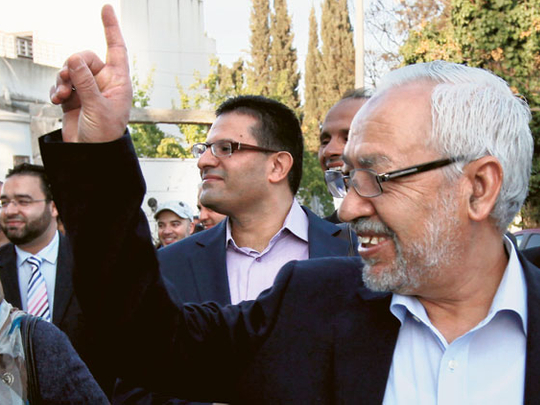
Tunis: Islamists are expected to do well in Tunisia's first democratic election today, ten months after autocratic leader Zine Al Abidine Bin Ali fled following a popular uprising that set off protest movements around the Arab world.
The Al Nahda party will almost certainly win a share of power after the vote, which will set a democratic standard for other Arab countries where uprisings have triggered political change or governments have tried to rush reforms to stave off unrest.
Today's vote is for an assembly which will draft a new constitution to replace the one Bin Ali manipulated to entrench his power. It will also appoint an interim government and set elections for a new president and parliament.
Al Nahda, banned under Bin Ali who is now in exile in Saudi Arabia, is expected to gain the biggest share of votes. But the Islamist party will probably not win enough to give it a majority in the assembly and will seek to lead a coalition.
Values under threat
The North African country's elite fear the rise of Al Nahda puts their secular values under threat. The Progressive Democratic Party (PDP) has centred its campaign on stopping the Islamists, vowing to seek alliances to keep it out of power.
Al Nahda has been at pains to assuage the concerns of secularists and Western powers, fielding several women candidates including one who does not wear the hijab, and promising not to undermine women's freedoms.
Tunisia was a pioneer of secular modernisation among Arab and Muslim countries in the post-colonial period, banning polygamy, equalising inheritance rights, giving women the right to vote and discouraging the veil.
Salafists have attacked a cinema and a TV station in recent months over artistic material deemed blasphemous. Al Nahda says they have nothing to do with them, but liberals do not believe them. Observers says Al Nahda's intentions are not clear. Its election campaign has scrupulously avoided offering policy details that mark it out as much different from its rivals.
At a final election rally on Friday, Suad Abdul Rahim, the female candidate who does not wear a veil, said Al Nahda would protect women's gains.
But illustrating the party's contradictions, many of the books on sale on the fringes of the rally were by Salafist writers who believe women should be segregated from men in public and that elections are un-Islamic.
"In the country's interior, where it's more conservative, they use different rhetoric," said commentator Rashid Khechana. "It's about stopping culture from outside, moral corruption of youth, defending Islam, which they say has Shura [consultation], not democracy."
Bloody conflict
An Al Nahda win would be the first such success in the Arab world since Hamas won a 2006 Palestinian vote. Islamists won a 1991 Algerian election the army annulled, provoking years of bloody conflict.
Al Nahda's fortunes could bear on Egyptian elections set for next month in which the Muslim Brotherhood, an ideological ally, also hopes to emerge strongest.
Libya hopes to hold elections next year, even as armed conflicts continue in Yemen and Syria.
Warning on poll rigging
Al Nahda's leader, Muslim scholar Rashid Gannouchi, riled opponents this week when he described the party as Tunisia's biggest and warned that the Tunisian people would start a new uprising if they suspected any poll rigging.
Prime Minister Al Baji Qaed Al Sibsi said in a televised address on Thursday that Tunisians should vote without fear of violence or cheating, a feature of Bin Ali's police state.
"No one can doubt the elections, they will be transparent and clean. Rigging will not be possible. The ballot boxes will be open to everyone," Al Sibsi said.
The government says 40,000 police and soldiers are being deployed to prevent any protests escalating into violence. Shopkeepers say people have been stockpiling milk and bottled water in case unrest disrupts supplies.












